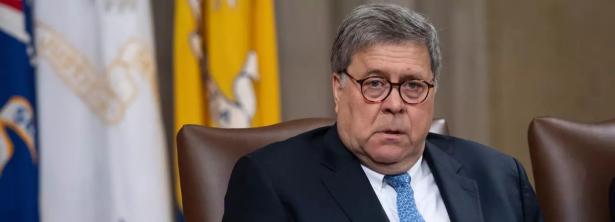Appeals Court Orders Release of Secret Memo Barr ‘Used To Undercut the Mueller Report’
A federal appeals court on Friday ordered the release of a 2019 memorandum about whether then-President Donald Trump obstructed Special Counsel Robert Mueller's investigation into Russian interference in the 2016 presidential election.
Citizens for Responsibility and Ethics in Washington (CREW)—the watchdog fighting to reveal the U.S. Department of Justice (DOJ) memo prepared for then-Attorney General Bill Barr—celebrated the ruling as a win.
"Attorney General Barr cited this memo as a reason not to charge President Trump with obstruction of justice," said CREW spokesperson Jordan Libowitz in a statement. "The American people deserve to know what it says. Now they will."
BREAKING: We won! We're going to get the secret memo Barr used to undercut the Mueller Report and claim it was insufficient to find Trump obstructed justice. And we're going to make it public.
— Citizens for Ethics (@CREWcrew) August 19, 2022
The unanimous ruling from three judges of the U.S. Court of Appeals for the District of Columbia Circuit affirmed a lower court's opinion about the DOJ Office of Legal Counsel memo—a redacted version of which was made public last year.
D.C. Circuit Chief Judge Sri Srinivasan, joined by Judges Judith Rogers and David Tatel, outlined how the DOJ tried to conceal most of the memo "based on the deliberative process privilege, which protects records documenting an agency's internal deliberations en route to a governmental decision," but the lower court judge, Amy Berman Jackson, rejected that argument.
Jackson determined the DOJ failed to show that the privilege applied—specifically, she found that the department "had not identified a relevant agency decision as to which the memorandum formed part of the deliberations," Friday's ruling highlights.
"The department's submissions, the court explained, indicated that the memorandum conveyed advice about whether to charge the president with a crime. But the court's in camera review of the memorandum revealed that the department in fact never considered bringing a charge," it continues. "Instead, the memorandum concerned a separate decision that had gone entirely unmentioned by the government in its submissions to the court—what, if anything, to say to Congress and the public about the Mueller report."
As Bloomberg detailed:
Srinivasan... wrote that any analysis in the memo about bringing obstruction charges was more like a "thought experiment."
Srinivasan noted that the department expressed "regret" about leaving a "misimpression that an actual charging decision was under consideration," but he wrote that it missed opportunities to address the true purpose of the memo.
The court rejected the government's request for another chance to make the case for keeping the full memo secret. Srinivasan wrote that the Justice Department might have successfully argued to keep the memo sealed if it had revealed the public messaging purpose from the beginning and then tried to invoke what's known as the deliberative process privilege, but that it was too late now.
The DOJ has a week to consider appealing the latest decision. The Washington Post reported that spokespeople for the department and Barr declined to comment.
Politico noted Friday:
Trump was never charged in Mueller's probe and the special prosecutor's final report declined to opine on whether what he did in response to the investigation amounted to a crime.
However, some Trump opponents have called on the Attorney General Merrick Garland to reconsider the issue now that Trump is no longer president. Release of the long-sought DOJ memo could fuel those calls and draw more unwanted attention to Trump's potential criminal liability at a time when he is besieged by a slew of other legal woes relating to his handling of classified government records, his role in inspiring many of those involved in the January 6 attack on the Capitol, and his broader efforts to overturn Joe Biden's win in the 2020 presidential election.
As Common Dreams reported Thursday, a federal judge gave the DOJ a week to propose redactions to the warrant affidavit containing the information that led to last week's search of Mar-a-Lago, Trump's Florida home.
This post has been updated with additional details about the ruling.
Jessica Corbett is a staff writer for Common Dreams.
Please support Common Dreams. The 1% own and operate the corporate media. They are doing everything they can to defend the status quo, squash dissent and protect the wealthy and the powerful. The Common Dreams media model is different. We cover the news that matters to the 99%. Our mission? To inform. To inspire. To ignite change for the common good. How? Nonprofit. Independent. Reader-supported. Free to read. Free to republish. Free to share. With no advertising. No paywalls. No selling of your data. Thousands of small donations fund our newsroom and allow us to continue publishing. Can you chip in? We can't do it without you.
Please the Common Dreams website to donate or to receive the newsletter. Thank you.


Spread the word